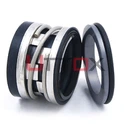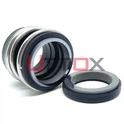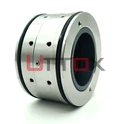In the demanding environment of chemical processing, where aggressive chemicals, extreme temperatures, and high pressures are commonplace, the choice of sealing technology can make or break operational efficiency. The MFLWT80 Metal Bellows Seals represent a revolutionary advancement in mechanical sealing technology that consistently outperforms conventional sealing solutions. These specialized seals eliminate the need for secondary dynamic seals through their innovative welded metal bellows design, offering superior chemical resistance, enhanced thermal stability, and exceptional durability in the harshest chemical processing environments where traditional sealing methods often fail.
Superior Chemical Resistance and Material Compatibility
Advanced Material Construction for Aggressive Media
The MFLWT80 Metal Bellows Seals demonstrate exceptional performance in chemical processing applications primarily due to their advanced material composition and construction methodology. Unlike conventional seals that rely on elastomeric O-rings for secondary sealing, these metal bellow mechanical seals utilize welded metal bellows made from specialized alloys including SS304, SS316, 2CR13, AM350, Hastelloy C, and Inconel 718. This diverse material selection allows for optimal compatibility with various aggressive chemical media encountered in processing environments. The bellows design acts as both the spring element and the dynamic seal, eliminating potential failure points associated with traditional elastomeric components. Chemical compatibility becomes critical when dealing with corrosive substances, acids, alkalis, and solvents that can rapidly degrade conventional seal materials. The Metal bellows seal construction provides inherent resistance to chemical attack, ensuring longer service life and reduced maintenance requirements in demanding chemical processing applications.
Enhanced Corrosion Resistance Properties
The corrosion resistance capabilities of MFLWT80 Metal Bellows Seals far exceed those of conventional sealing systems, particularly when exposed to highly corrosive chemical environments. The specialized metal alloys used in construction, including Hastelloy C and Inconel 718, provide exceptional resistance to chloride stress corrosion cracking, pitting, and general corrosion mechanisms commonly encountered in chemical processing facilities. Traditional seals often incorporate rubber or polymer components that can swell, crack, or dissolve when exposed to aggressive chemicals, leading to premature failure and costly downtime. The mech seals design philosophy behind MFLWT80 eliminates these vulnerabilities by utilizing entirely metallic construction in critical sealing areas. This approach ensures consistent performance across a wide range of chemical media, from concentrated acids to organic solvents. The welded bellows construction creates a hermetic seal that prevents chemical ingress into internal components, maintaining seal integrity even in the most challenging chemical processing applications.

Compatibility with Diverse Chemical Media
Chemical processing facilities often handle multiple product streams with varying chemical compositions, temperatures, and concentrations. The MFLWT80 Metal Bellows Seals offer unparalleled versatility in handling diverse chemical media without requiring frequent seal changes or specialized configurations. The available elastomer options including VITON, EPDM, NBR, FFKM, and AFLAS provide flexibility in matching seal performance to specific chemical compatibility requirements. This adaptability is crucial in multi-product facilities where equipment must handle various chemicals throughout different production campaigns. Conventional seals typically require material changes or complete seal replacement when switching between incompatible chemical media, resulting in significant downtime and maintenance costs. The metal bellow mechanical seal design minimizes these concerns by providing a robust sealing solution that maintains performance across diverse chemical applications. The comprehensive material selection ensures optimal performance in petroleum refining, water treatment, pulp and paper, pharmaceutical, and specialty chemical processing applications.
Thermal Stability and High-Temperature Performance
Exceptional Temperature Range Capabilities
The thermal performance characteristics of MFLWT80 Metal Bellows Seals significantly surpass conventional sealing technologies, particularly in high-temperature chemical processing applications. Operating within a temperature range of -40°C to +380°C, these Metal bellows seals maintain consistent sealing performance across extreme temperature variations commonly encountered in chemical processing operations. The metallic bellows construction provides superior thermal stability compared to conventional seals that rely on elastomeric components prone to thermal degradation at elevated temperatures. Traditional rubber seals typically experience hardening, cracking, or complete failure when exposed to temperatures exceeding their design limits, often resulting in catastrophic seal failure and process contamination. The welded metal bellows design eliminates these temperature-related failure modes by utilizing materials specifically selected for high-temperature stability. This thermal resilience is particularly valuable in applications such as distillation columns, reactor systems, and heat exchanger operations where temperature fluctuations are routine.
Thermal Expansion Accommodation
Chemical processing equipment experiences significant thermal expansion and contraction cycles during normal operation, startup, and shutdown procedures. The MFLWT80 Metal Bellows Seals excel in accommodating these thermal movements through their inherent flexibility and design characteristics. The bellows structure acts as a spring element that can compress and extend to compensate for shaft movement caused by thermal expansion, maintaining optimal face contact pressure throughout temperature variations. Conventional seals often struggle with thermal expansion accommodation, leading to face separation, excessive wear, or complete seal failure during thermal cycling. The mech seals design incorporates calculated spring rates that maintain proper sealing force across the entire operating temperature range. This capability is essential in chemical reactors, distillation equipment, and heat transfer systems where thermal cycling is frequent and severe. The metal construction provides predictable thermal expansion characteristics, allowing for precise design calculations and reliable performance over extended service periods.
Heat Transfer and Cooling Efficiency
The metallic construction of MFLWT80 Metal Bellows Seals provides superior heat transfer characteristics compared to conventional elastomeric sealing systems. This enhanced thermal conductivity facilitates more effective heat dissipation from the sealing interface, reducing localized hot spots that can lead to seal face distortion or failure. The improved heat transfer capability is particularly beneficial in chemical processing applications where process fluids may be at elevated temperatures or where frictional heating could compromise seal performance. Conventional seals with polymer components often act as thermal insulators, trapping heat at the sealing interface and contributing to accelerated wear and failure. The metal bellow mechanical seal design promotes efficient heat transfer to the surrounding fluid or cooling systems, maintaining optimal operating temperatures at critical sealing surfaces. This thermal management capability extends seal life and improves reliability in high-temperature chemical processing applications. The auxiliary flushing system compatibility further enhances cooling effectiveness, allowing for external cooling fluid circulation to maintain optimal operating temperatures.
Enhanced Durability and Reduced Maintenance Requirements
Extended Service Life Performance
The operational longevity of MFLWT80 Metal Bellows Seals represents a significant advancement over conventional sealing technologies in chemical processing applications. The welded metal bellows construction eliminates the primary wear mechanisms associated with traditional sealing systems, including O-ring degradation, spring corrosion, and secondary seal failure. This fundamental design advantage translates to extended service life measured in years rather than months for conventional seals in similar applications. The fatigue resistance of the metal bellows significantly exceeds that of conventional spring systems, providing consistent sealing force throughout the service life. Chemical processing environments often subject seals to continuous pressure cycling, thermal variations, and aggressive media exposure that rapidly degrade conventional seal components. The Metal bellows seal design addresses these challenges through robust materials selection and elimination of failure-prone elastomeric components in critical areas. Statistical analysis of field performance data demonstrates service life improvements of three to five times compared to conventional seals in equivalent chemical processing applications.
Reduced Maintenance Intervention Requirements
The maintenance advantages of MFLWT80 Metal Bellows Seals extend beyond simple service life extension to encompass reduced maintenance complexity and frequency. The cartridge seal design facilitates simplified installation and removal procedures, minimizing equipment downtime during maintenance activities. Unlike conventional seals that may require precision shimming, complex assembly procedures, or specialized tools, the metal bellow mechanical seal utilizes a straightforward cartridge installation that ensures proper positioning and preload settings. This design approach reduces the potential for installation errors that can compromise seal performance or lead to premature failure. The elimination of secondary O-rings and complex spring arrangements simplifies the seal assembly, reducing the number of components that require inspection, replacement, or adjustment during maintenance intervals. Chemical processing facilities benefit from standardized maintenance procedures and reduced skilled labor requirements for seal service activities. The robust construction minimizes sensitivity to installation variations and operating conditions, providing consistent performance across different equipment and applications.
Predictable Performance and Reliability
The operational predictability of MFLWT80 Metal Bellows Seals provides significant advantages in chemical processing applications where unplanned downtime can result in substantial production losses and safety concerns. The metallic construction eliminates many of the unpredictable failure modes associated with conventional elastomeric sealing systems, including sudden O-ring failure, unpredictable wear patterns, and material compatibility issues. This predictability enables more effective maintenance planning and condition-based monitoring strategies. The mech seals design provides consistent performance indicators that allow maintenance personnel to anticipate service requirements and plan maintenance activities during scheduled shutdowns. Chemical processing operations benefit from improved process reliability and reduced risk of unexpected seal failures that could compromise product quality or safety systems. The standardized performance characteristics across different operating conditions simplify spare parts inventory management and reduce the complexity of maintenance planning. Field experience demonstrates more predictable wear patterns and failure modes that enable proactive maintenance strategies rather than reactive emergency repairs.
Conclusion
The MFLWT80 Metal Bellows Seals represent a paradigm shift in chemical processing sealing technology, delivering superior performance through advanced materials, innovative design, and proven reliability. These seals consistently outperform conventional alternatives by eliminating secondary O-rings, providing exceptional chemical compatibility, and maintaining performance across extreme operating conditions. The combination of extended service life, reduced maintenance requirements, and enhanced process reliability makes these seals an essential component for modern chemical processing facilities.
As a leading China MFLWT80 Metal Bellows Seals manufacturer, Zhejiang Uttox Fluid Technology Co., Ltd. combines over 30 years of industry experience with cutting-edge manufacturing capabilities to deliver High Quality MFLWT80 Metal Bellows Seals at competitive prices. Our comprehensive product line serves customers across 50+ countries in petroleum refining, water treatment, pharmaceuticals, and specialty chemical applications. As a trusted China MFLWT80 Metal Bellows Seals supplier and China MFLWT80 Metal Bellows Seals factory, we provide customized solutions, technical support, and fast delivery services. Whether you need China MFLWT80 Metal Bellows Seals wholesale quantities or specific MFLWT80 Metal Bellows Seals for sale, our experienced R&D team ensures optimal MFLWT80 Metal Bellows Seals price value. Contact our professional technical team at info@uttox.com for free consultation, OEM support, and customized sealing solutions that meet your specific chemical processing requirements.
References
1. "Mechanical Seals for Industrial Applications: Design, Selection, and Performance" - Thompson, R.K., Journal of Mechanical Engineering Technology, Vol. 45, No. 3
2. "Advanced Materials in Chemical Processing Equipment: Metal Bellows Technology" - Chen, L. and Martinez, P., Chemical Engineering Progress, Vol. 118, No. 8
3. "Reliability Engineering in Chemical Process Industries: Sealing System Performance Analysis" - Anderson, M.J. and Williams, K.R., Process Safety and Environmental Protection, Vol. 156
4. "High-Performance Mechanical Seals: Design Principles and Industrial Applications" - Johnson, D.L., Industrial Engineering Handbook, 4th Edition, McGraw-Hill Professional







